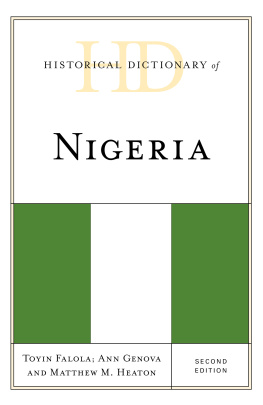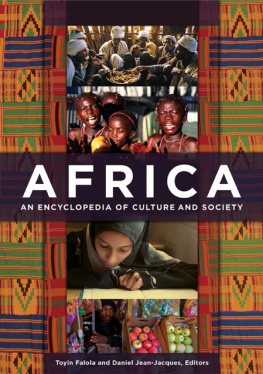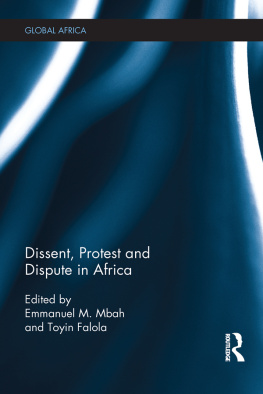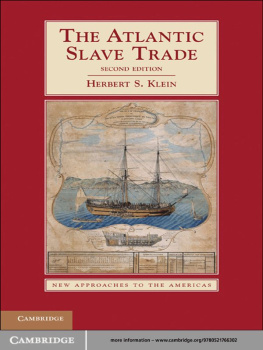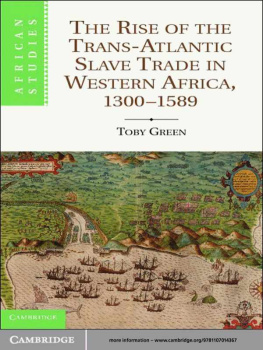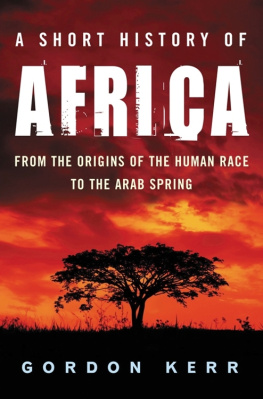UNITED STATES AND AFRICA RELATIONS, 1400S TO THE PRESENT
UNITED STATES AND AFRICA RELATIONS, 1400S TO THE PRESENT
Toyin Falola and Raphael Chijioke Njoku
Yale UNIVERSITY PRESS
New Haven & London
Published with assistance from the Louis Stern Memorial Fund.
Copyright 2020 by Toyin Falola and Raphael Chijioke Njoku.
All rights reserved.
This book may not be reproduced, in whole or in part, including illustrations, in any form (beyond that copying permitted by Sections 107 and 108 of the U.S. Copyright Law and except by reviewers for the public press), without written permission from the publishers.
Yale University Press books may be purchased in quantity for educational, business, or promotional use. For information, please e-mail (U.K. office).
Set in Electra type by Newgen North America.
Printed in the United States of America.
Library of Congress Control Number: 2019956877 ISBN 978-0-300-23483-1 (paper : alk. paper)
A catalogue record for this book is available from the British Library.
This paper meets the requirements of ANSI/NISO Z39.48-1992 (Permanence of Paper).
10 9 8 7 6 5 4 3 2 1
To Prof. John E. McLeod and Dr. Mary McLeod
CONTENTS
PREFACE
The idea of this book materialized from deep contemplation of the momentous election of Barack Obama to the presidency in November 2008 and all it tells us about African Americans six-century-long journey in the Americas. As Obamas second term was ending, the authors compiled a plan for an account of the long-running United States-Africa relationship that paved his road to the White House. The story of United States-Africa relations is rooted in the trans-Atlantic slave trade beginning in the mid-fifteenth century. The relationship gradually developed with Black struggles for emancipation, enfranchisement, and empowerment. The struggle spanned several centuries and is in certain respects ongoing. In other words, the Black odyssey was the mother of the unique relationship between Africa and the United States of America.
In an academic field that has witnessed a profusion of literature reflecting diverse disciplinary perspectives, this account of United States-Africa relations from the fifteenth century to the present is complex and challenging. Given the overflow of events from one historical period to another, it was sometimes difficult to impose a neat chronological structure. In terms of methodology, it was unavoidable now and then to use social science theories to shed light on some ideas in the historical narrative. Yet, we acknowledge that a discourse of this nature, located at the intersection of race, oppression, religious creed, and nationalist ethos, has the potential to stir up a wide range of human emotions, misconceptions, and agitated debates. Our intent is purely academic: to provide scholars, graduate and undergraduate students interested in Africana studies, African American studies, African studies, Atlantic history, world history, and international relations with a one-stop account of Africas bonding with the United States.
The process of economic, cultural, and political bonding began long before the official founding of Britains American colonies, and its geographical spread encompasses the entire Atlantic world. Our emphasis on the United States is amply justified. The United States represents the most successful and powerful of all the colonies the Europeans built in the age of imperialism. Despite the difficult circumstances in which they strived, the Black population occupies a central position in the American success story. African Americans now constitute the most potent Black community in the world.
Considering the length of time this book covers, prioritizing the African American experience is the most suitable but not the only model for historicizing United States-Africa relations. The manner in which Whites treated Blacks in America shaped the nature and substance of the United States-Africa relationship. The African American experience was the most notable life force that produced the trans-Atlantic exchanges and continued to drive them until 1900. This process will likely continue to affect the future of United States-Africa relations.
We therefore delineate the foundations of United States-Africa relations through the prisms of slavery, emancipation, colonization, American missionary evangelism, and Pan-Africanism. If the African American perspective is dominant in the various foundational themes so explored, it is because the United States-Africa relationship, over these historical eras, was more about the enslaved people and how their fate in the Americas affected the future of Africa than anything else. The trials and pains of the men and women in bondage reverberated across the Atlantic world and impacted sociopolitical and economic developments in the African continent, including the abolitionist movement that led to the founding of Sierra Leone and Liberian colonies.
The emphasis on the African American connection tapers as Africa emerged from European colonial rule after World War II. It was in the context of the Cold War that the United States began to implement a more articulate foreign policy toward Africa. As a result, the tone of the books narrative changes from a primarily historical account to a more contemporary approach to foreign policy.
In the process of writing this book, we consulted numerous libraries, archives, depositories, and museums, and borrowed materials from many colleagues. We owe immense gratitude to several friends, colleagues, and anonymous referees who read several drafts of this book and provided insightful comments. Special thanks to Erika Kuhlman, Kevin Marsh, John Gribas, and Kandi Turley-Ames for organizing a forum (with funds from the Idaho Humanities Council) at which the first draft of this book was presented. The participation of the Red Hill Band and the entire audience at that Caf added an extra flavor to the discussion. We owe immense gratitude to King Yik for his generosity with ideas and materials for this research. The final product of the book, therefore, is a composite of our original designs and thoughts from our readers, audience, and colleagues.
We thank Yale University Presss acquisitions editor and faculty Publications Committee for supporting this ambitious project. Together, they provided the motivation and enthusiasm that have seen to the successful completion of United States and Africa Relations, 1400s to the Present.
INTRODUCTION
This multilayered study of the history of relations between Africa and the Americas focuses on the United States from the colonial era to the present. The relationship began with the dawn of the trans-Atlantic slave trade, which preceded the official founding of the United States. As a result, the early stage of United States-Africa relations is situated within the history of slavery and African American struggles for survival, emancipation, and reconnection with the African ancestral homeland. The Black struggle in America intersects with economic exchanges and wealth production, race relations, cultural invention, colonialism, revolutionary movements in the Atlantic world, religion, politics, and intellectual ideas.
In a discourse involving two entities where one is an old continent (Africa) and the other (the United States) did not declare itself a sovereign state until July 4, 1776, one may wonder why going back to the 1400s matters. Before the founding of the American Colonization Society (ACS) and Liberia in the second decade of the nineteenth century, direct contact between America and Africa was limited. The justification for extending our history of the relationship back to the fifteenth century is to account for shifting concepts, geographical spaces, and peoples. Africa, Pan-Africanism, and the United States have meant different things at different times to different peoples.
Next page

